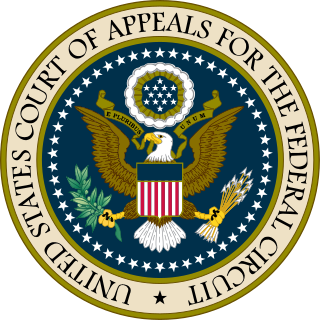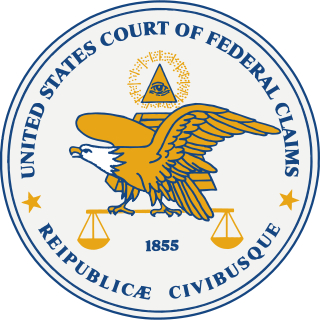Marbury v. Madison, 5 U.S. 137 (1803), was a landmark U.S. Supreme Court case that established the principle of judicial review in the United States, meaning that American courts have the power to strike down laws, statutes, and some government actions that they find to violate the Constitution of the United States. Decided in 1803, Marbury remains the single most important decision in American constitutional law. The Court's landmark decision established that the U.S. Constitution is actual law, not just a statement of political principles and ideals, and helped define the boundary between the constitutionally separate executive and judicial branches of the federal government.
In the United States, a state court has jurisdiction over disputes with some connection to a U.S. state. State courts handle the vast majority of civil and criminal cases in the United States; the United States federal courts are far smaller in terms of both personnel and caseload, and handle different types of cases.

The United States Court of Appeals for the Federal Circuit is a United States court of appeals headquartered in Washington, D.C. The court was created by Congress with passage of the Federal Courts Improvement Act of 1982, which merged the United States Court of Customs and Patent Appeals and the appellate division of the United States Court of Claims, making the judges of the former courts into circuit judges. The Federal Circuit is particularly known for its decisions on patent law, as it is the only appellate-level court other than the Supreme Court with the jurisdiction to hear patent case appeals.
Justiciability concerns the limits upon legal issues over which a court can exercise its judicial authority. It includes, but is not limited to, the legal concept of standing, which is used to determine if the party bringing the suit is a party appropriate to establishing whether an actual adversarial issue exists. Essentially, justiciability seeks to address whether a court possesses the ability to provide adequate resolution of the dispute; where a court believes that it cannot offer such a final determination, the matter is not justiciable.
The federal judiciary of the United States is one of the three branches of the federal government of the United States organized under the United States Constitution and laws of the federal government. Article III of the Constitution requires the establishment of a Supreme Court and permits the Congress to create other federal courts, and place limitations on their jurisdiction. Article III federal judges are appointed by the president with the consent of the Senate to serve until they resign, are impeached and convicted, retire, or die.
Standard Oil Co. of New Jersey v. United States, 221 U.S. 1 (1911), was a case in which the Supreme Court of the United States found Standard Oil Co. of New Jersey guilty of monopolizing the petroleum industry through a series of abusive and anticompetitive actions. The Court's remedy was to divide Standard Oil into several geographically separate and eventually competing firms.

The United States Court of Federal Claims is a United States federal court that hears monetary claims against the U.S. government. It is the direct successor to the United States Court of Claims, which was founded in 1855, and is therefore a revised version of one of the oldest federal courts in the country.
Federal tribunals in the United States are those tribunals established by the federal government of the United States for the purpose of resolving disputes involving or arising under federal laws, including questions about the constitutionality of such laws. Such tribunals include both Article III tribunals as well as adjudicative entities which are classified as Article I or Article IV tribunals. Some of the latter entities are also formally denominated as courts, but they do not enjoy certain protections afforded to Article III courts. These tribunals are described in reference to the article of the United States Constitution from which the tribunal's authority stems. The use of the term "tribunal" in this context as a blanket term to encompass both courts and other adjudicative entities comes from section 8 of Article I of the Constitution, which expressly grants Congress the power to constitute tribunals inferior to the Supreme Court of the United States.

Cottonseed is the seed of the cotton plant.
Northern Pipeline Construction Company v. Marathon Pipe Line Company, 458 U.S. 50 (1982), is a United States Supreme Court case in which the Court held that Article III jurisdiction could not be conferred on non-Article III courts.
The pre-existing duty rule is an aspect of consideration within the law of contract. Originating in England the concept of consideration has been adopted by other jurisdictions, including the US.

The United States District Court for the Eastern District of Missouri is a trial level federal district court based in St. Louis, Missouri, with jurisdiction over fifty counties in the eastern half of Missouri. The court is one of ninety-four district-level courts which make up the first tier of the U.S. federal judicial system. Judges of this court preside over civil and criminal trials on federal matters that originate within the borders of its jurisdiction. It is organized into three divisions, with court held in St. Louis, Hannibal, and Cape Girardeau.

The United States District Court for the Western District of Missouri is the federal judicial district encompassing 66 counties in the western half of the State of Missouri. The Court is based in the Charles Evans Whittaker Courthouse in Kansas City.

Arbitration, a form of alternative dispute resolution (ADR), is a way to resolve disputes outside the judiciary courts. The dispute will be decided by one or more persons, which renders the 'arbitration award'. An arbitration decision or award is legally binding on both sides and enforceable in the courts, unless all parties stipulate that the arbitration process and decision are non-binding.
The Court of Claims was a federal court that heard claims against the United States government. It was established in 1855, renamed in 1948 to the United States Court of Claims, and abolished in 1982. Then, its jurisdiction was assumed by the newly created United States Court of Appeals for the Federal Circuit and United States Claims Court, which was later renamed the Court of Federal Claims.
Ware & Leland v. Mobile County, 209 U.S. 405 (1908), is a case in which the United States Supreme Court held that contracts for the sales of cotton for future delivery that do not oblige interstate shipments are not subjects of interstate commerce. The Court also held that a state tax on persons engaged in buying and selling cotton for future delivery was not a regulation of interstate commerce, and that the imposition of the tax was not beyond the power of the state.
Southern Pacific Terminal Co. v. ICC, 219 U.S. 498 (1911), was a United States Supreme Court decision that held that while normally, in order for the court to hear a case, there must still be a controversy outstanding, when the issue was such that it would be of short duration, and would most likely become moot before appellate review could take place, and that the issue was likely to reoccur, then the court could hear the issue.

A contract is a legally binding document between at least two parties that defines and governs the rights and duties of the parties to an agreement. A contract is legally enforceable because it meets the requirements and approval of the law. A contract typically involves the exchange of goods, service, money, or promise of any of those. "Breach of contract", means that the law will have to award the injured party either the access to legal remedies such as damages or cancellation.
Stern v. Marshall, 564 U.S. 462 (2011), was a United States Supreme Court case in which the Court held that a bankruptcy court, as a non-Article III court lacked constitutional authority under Article III of the United States Constitution to enter a final judgment on a state law counterclaim that is not resolved in the process of ruling on a creditor's proof of claim, even though Congress purported to grant such statutory authority under 28 U.S.C. § 157(b)2(C). The case drew an unusual amount of interest because the petitioner was the estate of former Playboy Playmate and celebrity Anna Nicole Smith. Smith died in 2007, long before the Court ultimately decided the case, which her estate lost.

Randolph Daniel Moss is a United States District Judge of the United States District Court for the District of Columbia.








